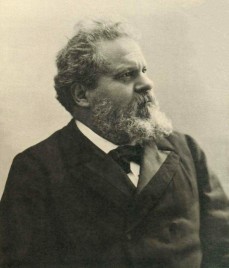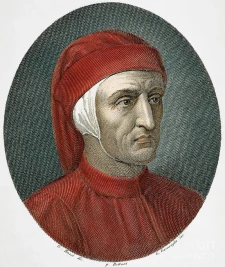Giosuè Carducci: Dante

Dante
Strong forms were those of the New Life, that stood
Around thy cradle,
O Master of the song that looks above!
A brave young giantess,
Unknown before to Greek or Latin shores,
Daring in love and hate, and fair withal,
Came Tuscan Libertade, and the child
Already with bounteous breast did comfort thee.
And all a-glowing with her spheral rays,
Mild and austere in one,
Came Faith: and she, across a shore
Obscure with crowds of visions and of shades,
Opened for thee the Gate of the Infinite.
Sighing and pensive, yet with locks aglow
With rosy splendour from another air,
Love made long stay.
And such the gentle things
He talked to thee with bashful lips, so sweetly
He entered all the chambers of thy heart,
That no one ever knew to love like thee.
But soon away from lonely meditating,
O youthful recluse,
Wild clamour and fierce tumult tore thee, and
The fury of brothers seeking brothers’ blood.
Thou heard’st the hissing flames of civil war
On neighbour’s walls; thou heardest women shriek
To heaven that altars and the marriage bed,
The dear hearth-stone and the infant’s cradle,—
All that made fair the marital abode,
Were swept away in one great gulf of flame.
Their men had rushed from their embrace to arms;
The youth breathed only anger and destruction.
Thou sawest the raging of swords
Seeking the breast-plunge;
Thou heardest the dying warrior
Blaspheme and curse:
Before thee, streaming with gore,
Gold locks and grey;
And the Furies offering
To Liberty the execrated host
Of human victims;
And Death, the cruel arbiter of fates,
Crumbling the mighty towers and opening
The long-barred gates.
Amid wild scenes
So grew thy Italian soul,
And prayed that the long civil hate might end.
Meanwhile he saw
Of love such pure revealings and so strange,
The which depicted in the shade
Of a young myrtle-tree,
Each one who saw must bow the head in reverence.

But o’er this gentle dream
There came the voice of weeping,
Bitterly sounding from the maternal source.
Alas! broken by the whirlwind,
Lies the fair myrtle,
And with wide-spread wings
The dove of sweet affection is flown forth
To seek a purer aura for its flight.
He, driven here and there
In the thick darkness of the turbulent age,
Sought refuge with the famous shades of old;
So learned to hate himself and present things.
And in the twilight came he forth a giant,
Seeming a shade himself—an angry shade
Who through the desert went from tomb to tomb,
Now questioning and now embracing them:
Until before him rose across the ruin
And dust of these barbaric ages gone,
Like a cloudy pillar, the ancient Latin valour.
Then all that such a ruin tells did burst
Upon the silent air in one great cry.
In the exalted vision
Arose the poet divine; and now, disdaining
His stricken land and time that only wasted
In petty aimless strife the ancient strength,
He, in the seeing of his heart’s desire,
Saluted thee, O modern Italy,—
One, in thy valiant arms, thy laws, thy speech.
And then, to truly tell
What such a vision meant, he sought to know
The life that rolls through all the sea of being.
From beneath the dust of buried centuries
He made things good and ill to tell their tale
Through him the fatal prophet: till his voice
Resounded through the world, and made the ages
Turn and behold themselves. Judge and lord,
He placed them where they could themselves behold,
Admired and wept, disdained and laughed at them;
Then shut them up in his eternal song,
Well pleased that he had power to do this much.
And meanwhile this poor tangle
Where the weeping and the wailing still goes on,
This endless fraud and shadow
Which has the name of life and is so base,—
All this didst thou despise! Thy sacred muse
Explored the depths of all the universe.
Following the good gentile Philosopher
Who placed thee in the midst of secret things,
Thou didst desire to see as angels see
There where there is no intervening veil;
And thou wouldst love as they do love in heaven.
Up through the ways of love
The humble creature
Pushing his way to the Creator’s presence,
Wished to find rest in that eternal Truth
Which taught thee the great love and the great thought.
Here Virgil failed thee,
And thou, deserted,
A lonely human spirit as if drowned
Within the abyss of thy immense desire,
Didst vanish overwhelmed in doubt,—
When as on wings
Angelical there came unto thy grief
She who is love and light and vision
Between the understanding and the True.
No mortal tongue like mine may give her name,
But thou who lovedst didst call her Beatrice.
And so from sphere to sphere
‘T was naught but melody that thou didst hear,
‘T was naught but one great light that thou didst see,
And every single sense thou hadst was love,
And verse and spirit made one harmony
Like unto her who there revealed herself.
Alas! what caredst thou then
For thy poor country and the endless strife
That rent its cities like, alas! even those
That make forever dark the vales of hell!
From heaven descending thou didst thrice bring down
The Hymn Supreme, and all the while there shone
Upon thy brow a radiance divine
Like his who spake with God in Sinai.
Before thee shining
In all the splendour of the holy Kingdom
Flashed in its crimson light the mortal field
Of Montaperto, and along the wastes
Deserted and malignant came the sound,
Dreary and dull, of dying warriors’ sighs:
To which far off responded
With a great cry of mingled human woe
The cursed battle-field of Campaldino.
And thou, Rea Meloria,
Didst rise from the Tuscan sea
To tell the glory of this horrid slaughter,
And of the Thyrrenian shores made desolate
With this our madness, and the sea’s great bosom
All stained with blood, and far Liguria’s strand
Filled with the moan of lonely Pisan exiles
And children born for fratricidal war.
Giosuè Carducci
(1835 – 1907)
Dante
• fleursdumal.nl magazine
More in: # Classic Poetry Archive, Archive C-D, Archive C-D, Dante Alighieri

